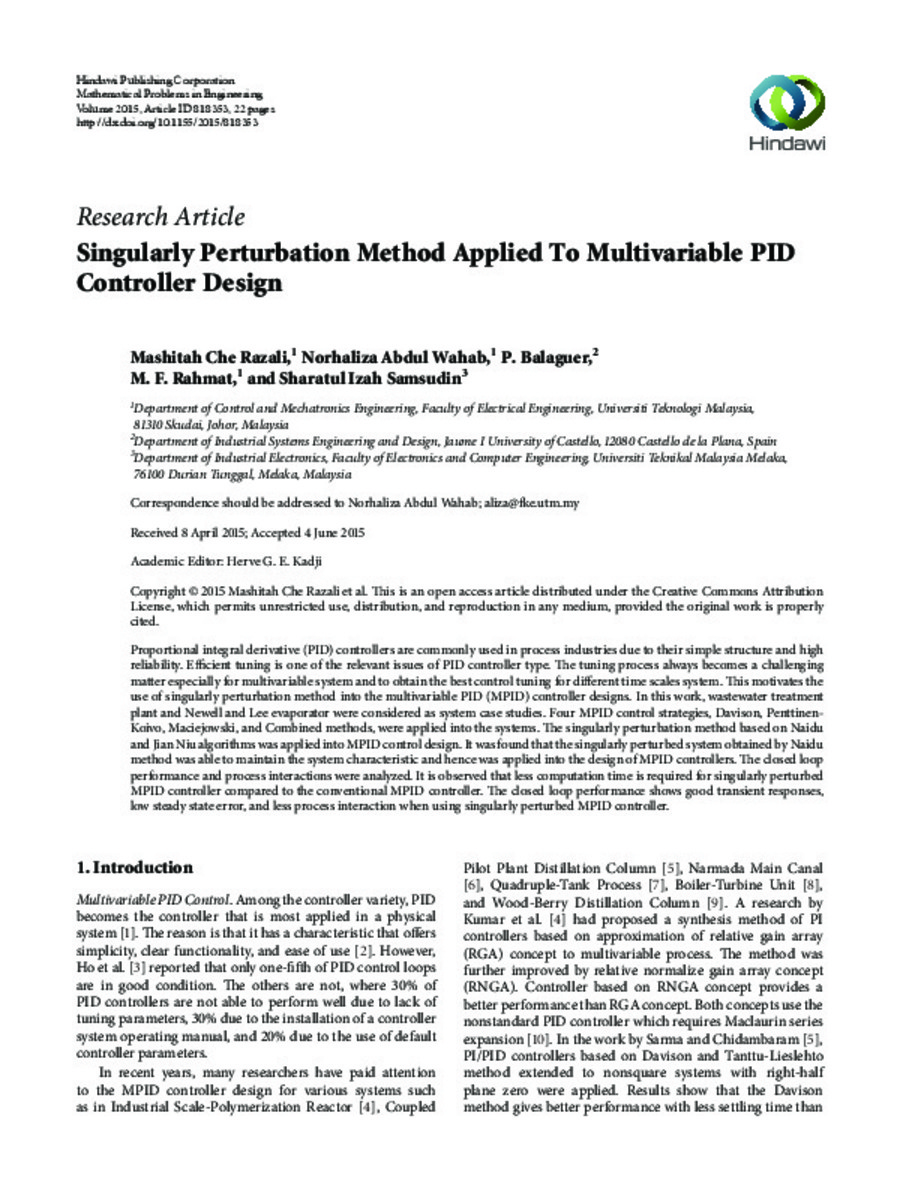Mostrar el registro sencillo del ítem
Singularly Perturbation Method Applied To Multivariable PID Controller Design
| dc.contributor.author | Che Razali, Mashitah | |
| dc.contributor.author | Abdul Wahab, Norhaliza | |
| dc.contributor.author | Balaguer, Pedro | |
| dc.contributor.author | Rahmat, M.F. | |
| dc.contributor.author | Samsudin, Sharatul Izah | |
| dc.date.accessioned | 2016-03-11T11:38:42Z | |
| dc.date.available | 2016-03-11T11:38:42Z | |
| dc.date.issued | 2015 | |
| dc.identifier.citation | CHE RAZALI, Mashitah, et al. Singularly Perturbation Method Applied To Multivariable PID Controller Design. Mathematical Problems in Engineering, 2015, vol. 2015, p. 1. | ca_CA |
| dc.identifier.issn | 1024-123X | |
| dc.identifier.issn | 1563-5147 | |
| dc.identifier.uri | http://hdl.handle.net/10234/153431 | |
| dc.description.abstract | Proportional integral derivative (PID) controllers are commonly used in process industries due to their simple structure and high reliability. Efficient tuning is one of the relevant issues of PID controller type. The tuning process always becomes a challenging matter especially for multivariable system and to obtain the best control tuning for different time scales system. This motivates the use of singularly perturbation method into the multivariable PID (MPID) controller designs. In this work, wastewater treatment plant and Newell and Lee evaporator were considered as system case studies. Four MPID control strategies, Davison, Penttinen-Koivo, Maciejowski, and Combined methods, were applied into the systems. The singularly perturbation method based on Naidu and Jian Niu algorithms was applied into MPID control design. It was found that the singularly perturbed system obtained by Naidu method was able to maintain the system characteristic and hence was applied into the design of MPID controllers. The closed loop performance and process interactions were analyzed. It is observed that less computation time is required for singularly perturbed MPID controller compared to the conventional MPID controller. The closed loop performance shows good transient responses, low steady state error, and less process interaction when using singularly perturbed MPID controller. | ca_CA |
| dc.description.sponsorShip | The authors wish to thank the Research University Grant (GUP) vote 05H44 Universiti Teknologi Malaysia for the financial support. | ca_CA |
| dc.format.extent | 22 p. | ca_CA |
| dc.format.mimetype | application/pdf | ca_CA |
| dc.language.iso | eng | ca_CA |
| dc.publisher | Hindawi Publishing Corporation | ca_CA |
| dc.relation.isPartOf | Mathematical Problems in Engineering, 2015, vol. 2015 | ca_CA |
| dc.rights | Attribution 4.0 Spain | * |
| dc.rights.uri | http://creativecommons.org/licenses/by-sa/4.0/ | * |
| dc.subject | multivariable PID controller | ca_CA |
| dc.subject | MPID controller | ca_CA |
| dc.subject | proportional integral derivative | ca_CA |
| dc.subject | singularly perturbation method | ca_CA |
| dc.title | Singularly Perturbation Method Applied To Multivariable PID Controller Design | ca_CA |
| dc.type | info:eu-repo/semantics/article | ca_CA |
| dc.identifier.doi | http://dx.doi.org/10.1155/2015/818353 | |
| dc.rights.accessRights | info:eu-repo/semantics/openAccess | ca_CA |
| dc.relation.publisherVersion | http://www.hindawi.com/journals/mpe/2015/818353/ | ca_CA |
Ficheros en el ítem
Este ítem aparece en la(s) siguiente(s) colección(ones)
-
ESID_Articles [463]








